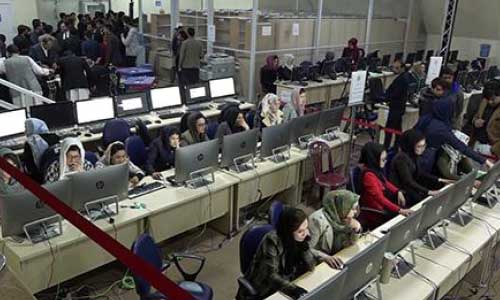KABUL - The Independent Election Commission (IEC) on Sunday said it has started transferring data from the biometric identification devices, used in the recent elections, to its main servers.
The process of transferring data from the biometric identification devices to the main servers will be completed within two weeks, said the IEC.
“We will finally track how many votes had been cast through biometrics and how many were cast based on the voters list, the percentage will be found,” said IEC chief Abdul Badi Sayyad.
So far the IEC has processed the votes from ten provinces.
According to the IEC, until now, biometric identification devices from 23 provinces have arrived in Kabul.
“Biometric devices and result sheets should have been brought together, today we formally started the transfer of data, the job will be completed in two weeks,” said IEC’s IT department chief Sayed Ibrahim Sadat.
But the political parties have said that they will only consider the votes, registered on the biometric system, as being credible.
“We should identify which votes have barcodes and which votes do not have barcodes. Which votes cast through biometric units and which votes were not. Therefore there is a need for the recounting of the votes,” said Noor Rahman Akhlaqi, member of the political committee of the political parties and movements.
But election watchdogs have expressed doubt over the IEC’s capacity to separate fraudulent votes from valid votes.
Previously the IEC pledged to not include votes of people whose details had not been included in the biometric system.
The use of biometric devices was the result of government’s decision to hold a transparent election – following increased pressure by political parties.
Almost 22,000 biometric devices were purchased by government from a German company. The distribution to some provinces of the devices was delayed and election employees had problems using the new system on election day.
The government allocated $20 million to purchase these devices.
This comes a week after IEC overturned an earlier decision and said it will count the votes where voters’ details were not entered into the biometric system.
The IEC said that the voting process continued on the basis of the voters list at polling stations where biometric devices did not work, and that there was no reason to disqualify these votes.
Recently a number of political parties criticized the IEC for what they called poor management and said the elections had been riddled with fraud.
The parties’ representatives said at a press conference in Kabul the IEC had systematically deprived a number of people from voting in different parts of the country.
The arties asked the election commission to discard votes from polling centers where biometric devices were not used.
On Saturday October 20, hundreds of polling centers failed to open and many others opened late. There were also technical problems with the biometric devices. Because so many centers failed to open, the IEC extended elections by one day and opened over 200 of the 401 centers that had been closed on the Saturday. Even then, many of these centers opened late.
Voters however were furious about this and also criticized the election commission. They in turn accused them of poor management and claimed there had been numerous irregularities.
The parties said they will announce their final stance about the elections once their observers finish their jobs in monitoring the process.
The IEC is expected to announce the preliminary results of parliamentary elections on November 23 for provinces and December 1 for Kabul. (Tolo news)
Home » Afghanistan » IEC Begins Transfer of Data to its Main Servers
IEC Begins Transfer of Data to its Main Servers

